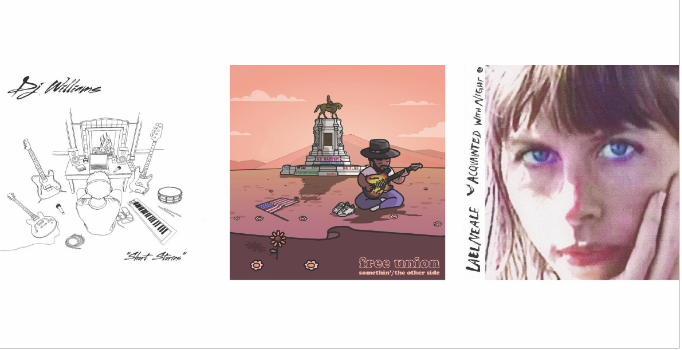DJ Williams
Short Stories, Projekt Music
For a musician who’s spent over a decade playing countless live shows, teaming up with industry heavy hitters from Questlove to Karl Denson, you wouldn’t think there’d be much ground left to cover. But Williams’ latest project, Short Stories, is something of a rebirth. It showcases his first time mixing and engineering an entire album at home. Across the disc’s six tracks, labeled “chapters,” Williams recorded all of the instruments himself. He bought all the gear and watched YouTube tutorials to achieve the sounds he wanted. Only later did he add appearances by Denson, Deshawn “Dvibes” Alexander (Eric Krasno Band), Kenneth Crouch (Eric Clapton), and more.
In essence, it’s Williams’ first official solo album (and his first release pressed to vinyl). But it’s not chock full of the familiar guitar riffs and solos that fans have come to know and love from him. Instead, each chapter is its own funky landscape with catchy melodies. Playful chapters like “Athleisure Wear,” “Quarantine Dreams,” and “Y’all Accept Bitcoin” boast humorous, good-natured fun to keep you dancing. (Released February 1)
Free Union
Somethin’ + The Other Side, Self-Released
Free Union hasn’t been dormant throughout this elongated season of quarantine. Over the past several months, the band has maintained a Quarantunes Series, releasing live versions of original songs like “Good Day to Cry” and “It Gets Better,” alongside holiday tunes and spirited covers of current pop hits by the likes of Harry Styles and Billie Eilish.
Spearheaded by Michael Coleman and Rob Dunnenberger, Free Union also stayed true to form by digging deep for two new tracks. Released as a double single, Somethin’ + The Other Side, each offers a glimmer of hope in the face of the harsh realities of white supremacy and deep- seated division displayed in 2020. “Somethin’” is the funkier of the two, a bop meant to embolden, while “The Other Side” is a smooth meditation on getting past struggle and strife.
With special guests including Morgan Burrs of Butcher Brown and mixing by Adrian Olsen at Montrose Studios, the Charlottesville-based group looked to Richmond for this release—even the cover art by Spanish artist Fredingrado reflects the changing tides, depicting the graffiti- adorned Robert E. Lee statue on Monument Avenue, which has been the site of public demonstrations and protests. It’s proof that uniting our communities through arts and advocacy paves the way for positive change. (Released January 22)
Lael Neale
Acquainted with Night,
Sub Pop Records
Growing up on her family’s farm in Albemarle County, Lael Neale was a devout fan of poetry, and held an affinity for nature writers like Ralph Waldo Emerson. When she moved to California to pursue music in 2009, her penchant for poems and the outdoors never waned. The up-and-comer signed to indie stalwart Sub Pop Recordsin the fall of 2020, and is making her label debut with Acquainted with Night, a collection that gives as much of a nod to central Virginia as it does to the West Coast.
Last April, Neale returned to her family’s farm to ride out part of quarantine. There, she picked up an old Sony Handycam and began shooting grainy videos to accompany the album’s songs, which were all written and recorded in Los Angeles. The video for “For No One For Now” is filled with Southern imagery: wide shots of an old church, scenes of the countryside viewed from a car window, and a protagonist cutting up peaches and spreading jam on toast. This track, alongside other singles like “Every Star Shivers in the Dark,” has a sonic uniformity rooted in minimalism, harkening back to Neale’s love of poetry. Recorded on a cassette recorder, the songs possess a gauzy, lo-fi quality that features Neale’s voice front and center, accompanied by a drum machine and an Omnichord (an instrument she didn’t pick up until 2019). By channeling the breadth of her surroundings, Neale has crafted a coast-to-coast dreamscape. (Release date: February 9)

